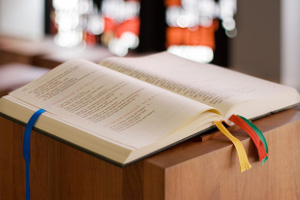 This text is so rich it is hard to know whether to go for the ‘dark deep’ (v.2) the ‘dragons’ (v.21) or ‘dominion’ (v.28) or the ultimate relationship between all those.
This text is so rich it is hard to know whether to go for the ‘dark deep’ (v.2) the ‘dragons’ (v.21) or ‘dominion’ (v.28) or the ultimate relationship between all those.
But I think that the real sting is in the tail end. So much so that even the chapter numbers want us to stop reading after six days, but there are seven days in this creation story. “… and he rested on the seventh day (…) on it God rested from all the work that he had done in creation.” (2: 2-3) What does that mean: “God rested”? What happens if God rests?
The Hebrew word for ‘rest’ that is used here is shabath this means to rest or to cease, desist. For example in Lamentation 5:14, 15 we find this word: old men ‘leaving’ the city gate, young men ‘ceasing’ their music. It seems to me the letting go of power and control, the letting go of worry, maybe. The writer of Hebrews 4 urges us to join God in his rest. I wonder whether Jesus is doing the same in Matthew 6. Both in Matthew 6 and in Hebrews 4 this is a very difficult thing. It requires a lot of trust. To cease the good work of creating is not easy. How difficult to let go of work, to let go of control, to trust. But God gives us an example and he blesses it. The deep trust God shows us in his resting is a blessing.
19 February 2017
Gen. 1:1-2:3
This weekly blog on one of the lectionary readings is by Anna-Claar Thomasson-Rosingh, Coordinator for the Centre for Encountering the Bible and Director of Studies for the Centre for Formation in Ministry.

Leave a Reply